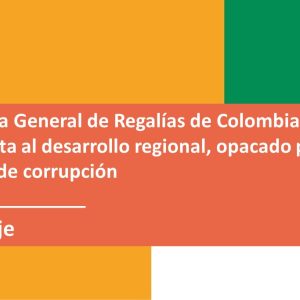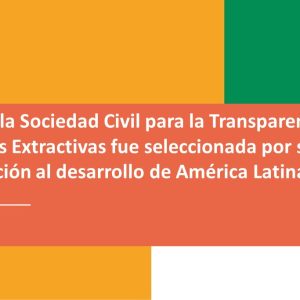During the week of March 6-10, 2017, Bogota was the scene of important discussion events on the challenges and challenges in terms of transparency in the Extractive Industries in the country and the world.
The XIII Latin American Forum of the LIE Network has just ended and offered the opportunity to recognize the progress and difficulties of civil society advocacy in the efforts for transparency and access to information regarding the contribution of the extractive industry to the development of the countries in the different links of the value chain.
Three dimensions that the civil society agenda should promote in this phase of the end of the commodities super-cycle were discussed: the political dimension, which allows for a better understanding of the so-called “commodities consensus” and the processes of weakening state institutions, especially in terms of decentralization, citizen participation and environmental management; the socio-economic dimension, which shows the negative impacts of extractive activities on economic growth and social welfare; and the environmental and climate change dimension, probably the one that shows the greatest risks to the welfare of communities.
This highlights the importance of advancing in the materialization of critical issues such as the publication of contracts, real beneficiaries, the strengthening of scenarios and mechanisms for citizen participation and advocacy, the inclusion of detailed socio-environmental aspects and the grounding of EITI initiatives at the sub-national level, among others.
Colombia is no stranger to these Latin American challenges and although it hosted the sessions of the international EITI Board and launched the second report for Colombia (with sector information for 2014-2015), some efforts are still needed to make the Colombian exercise more grounded and consistent with the needs of local communities that demand greater transparency in the sector.
The important progress made in the preparation of the two country reports and the work carried out to achieve this important contribution to transparency for the public is acknowledged. However, and in view of the results obtained so far, civil society considers that the inclusion of environmental issues, the approach to the real beneficiaries of the companies, the inclusion of information disaggregated by project, the progress towards more decisive bets towards the inclusion of information on the small mining sector, and the approach to the subnational scale (understood as a breakdown of relevant information and with the opportunity to replicate the instances of consultation at the departmental and municipal level) are issues that should mark the north to be followed; not only to reinforce the transparency of this industry in Colombia within the framework of Eiti, but also to advance an autonomous agenda in this regard.
Finally, we fully support and agree with our colleagues participating in the LIE Network that “the inclusion of this information in national EITI reports will contribute to the reduction of social conflicts, better governance of natural resources and the promotion of human rights”.


